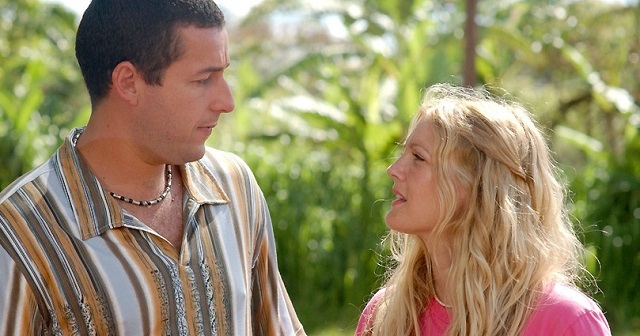
“If your mind is empty, it is always ready for anything; it is open to everything. In the beginner’s mind there are many possibilities; in the expert’s mind there are few.” ~ Shunryu Suzuki
.
In the movie “50 First Dates,” Drew Barrymore plays a young woman called Lucy, who suffers from short term memory loss following a major car accident.
As a result, she wakes up every morning thinking it’s the same day—October the 13th. She forgets everyone and everything. Each day, she experiences life anew, without any judgement or preconceived ideas.
As such, she is always joyful, intrigued, and in awe of every detail of her life. After the accident, she meets Henry, who goes on to become her husband. She wakes up every day forgetting who he is, and then goes through the whole process of loving him again, as if stuck in those beautiful first hundred days of love.
How wonderful would our lives be if we could press a reset button at the end of each day and rid ourselves of the accumulated judgement and meaning loaded onto our experiences? If we could just live those experiences wholeheartedly? Singing in the rain wouldn’t necessarily have to mean catching a cold, for example. Trying a new marketing strategy wouldn’t have to mean being rebuked by our boss.
Our brains are hardwired for novelty. When there is nothing new, we become bored, and our lives become stagnant. The problem is that as we grow in years, knowledge, and expertise, we start to think we know it all. We become more closed-minded and push away any new information that challenges our set beliefs.
We look only for the information that validates our pre-existing mindset about someone, someplace, or something. We stereotype the people in our lives, compartmentalising incoming information. ”She’s too loud,” so we stop listening to her. “He’s weird, because he’s wearing a striped suit and a bow tie,” so we can’t take him seriously.
In Zen Buddhism, there is a concept known as “Shoshin,” which means “beginner’s mind.” To achieve this state of mind, we must let go of our preconceived ideas and remain open to the many possibilities and experiences available to us. It’s like emulating the mind of a child who is discovering something for the first time, like riding a bicycle.
Possessing a beginner’s mind means releasing our expectations and constantly looking at every aspect of our lives as if for the first time—with awe and wonder.
Steve Jobs studied Buddhism and was fond of Suzuki’s book, Zen Mind, Beginner’s Mind. Through its teachings, he learned to trust his intuition and curiosity, rather than just using analysis and information. In 2005, he ended his Stanford commencement speech, with the phrase, “Stay hungry. Stay foolish.” Here, the word “foolish” referred to the beginner’s mindset—remaining open to new ideas and taking on risks without stifling ideas with a limited belief system.
Shoshin, or beginner’s mind, can improve our lives particularly in the following ways:
1. It tames the ego. Whenever we have an experience, our ego starts speaking incessantly with opinions, labels, and warnings. It doesn’t want us to have new thoughts that differ from our existing beliefs. Our ego wants us to use our old methods to focus on its validation through winning, perfectionism, and superiority.
To the ego, the beginner’s mind is the enemy. It uses novelty to get us out of our comfort zone—and thus, out from under ego’s control, which could lead us to contentment, compassion, and peace.
When a young man approached Socrates to tell him that the people believed he was the wisest man alive, he replied, “If that is true, then it is because I know that I don’t know.”
2. It fosters better connection with others. Instead of assuming we know everything about the people around us, we can treat them like they are new people we want to get to know. When we focus our energy on listening instead of talking, and on understanding rather than lecturing, we learn so much that others wanted to share but couldn’t before. We start to discover who they truly are.
There’s no need to win every argument or preach when we have a beginner’s mind, and differing viewpoints become much more interesting and beneficial to us.
In the movie I described above, Lucy would always laugh at Henry’s jokes and stories. She didn’t infuse the jokes with additional meaning based on what he said or did the night before. She laughed because she found him funny.
3. It provides richer experiences and growth. Having a beginner’s mind is similar to going on holiday to some exciting destination. We bring out the adventurer’s spirit inside of us. We see places and things with intrigue. The day-to-day vicissitudes fade into the background. Having a meal at a restaurant we know nothing about becomes an adventure—rather than just “going out to eat.” We talk to waiters and taxi drivers; our interactions become an exchange of cultures, rather than services.
Last December, I went on holiday to Bali—and though it was hot, humid, and full of tourist traps, I enjoyed the adventure because everything was new to me. A lot of the places were similar to Ghana, where I live, but my experiences were free of any baggage that I carry in my home country.
4. It lessens our anxiety. Instead of worrying about an upcoming event, we can embrace not knowing and enjoy being in the present. Shoshin leads to mindfulness—paying attention to our current experience in a non-judgmental way. There is a certain beauty and simplicity in losing ourselves completely in what we are doing. It is at this moment that our critical voices shut down and allow our inner self to connect with the world. We welcome all emotions, thoughts, and sensations for those few moments.
I was once at the airport checking in an oversized item—an art piece I had received as a gift—and was directed to go to a special counter for checking it in. The delay frustrated me. A few years earlier, I would have flipped out and somehow returned the art piece or vented to someone close by. This time around, however, I told myself to embrace this as an adventure—and so, I was pleasantly surprised when the officials were so nice, and I found this hidden part of the airport interesting and novel.
With beginner’s mind, we continually renew our experience of the present moment. We become more open and joyful to whatever we are doing, wherever we are. All the labels and preconceptions fall away, and what remains is us and the experience.
With Shoshin, we embrace our vulnerability. With the pressure off, we get out of our mind and let go of perfection, comparison, and competition. We become free and surrender to the full, colourful experience at hand.
~
Author: Mo Issa
Image: movie still
Editor: Yoli Ramazzina
 Share on bsky
Share on bsky




Read 0 comments and reply